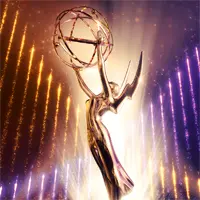Rude audience reaction shots were desperately needed on the Emmys and other pandemic awards shows
-

"When the 2020 Emmy Awards began on Sunday night, I felt that I had briefly time traveled," said Hazel Cills. "Jimmy Kimmel was giving a monologue on-screen to robust laughs, the camera cutting to a full house of well-dressed and un-masked celebrities clapping along. It all seemed eerily normal until Kimmel noticed himself in the audience shot, while he was also talking on stage. 'Of course we don’t have an audience,' Kimmel said, revealing that the awards show had just been using old stock footage and applause to give the spooky illusion of one. In reality the theater was stocked with cardboard cutouts of nominees, fake stand-ins who wouldn’t be able to deliver the one thing that makes tedious awards shows any good, the secret glue that holds them together: rude audience reaction shots. Actors and professionally beautiful people are experts at knowing where the camera is, whether it’s on set or waiting for them outside the exit of the West Hollywood Whole Foods, and largely how to act in front of one. That is unless they’re in the dimly lit audience seats of a major awards show televised to millions, and then all bets are off. Chris Pine openly weeping while watching a John Legend and Common performance? Sounds good. Chrissy Teigen looking sort of disgusted as her husband takes his award? Yes please. Taylor Swift dancing at the Grammys like your wine-drunk aunt Carol after she hears the first few notes of 'I Gotta Feeling' on a wedding party dance floor? I would like to see it."
ALSO:
- The 72nd Emmys ceremony could've reinvented the award show, instead it kept the stale parts: "The show undeniably had an unaccustomed variety — it necessarily broke out of the lock step of tuxedos, teleprompters, crowd shots and walks to the podium," says Mike Hale. "But instead of enlivening the proceedings, the mix of pretaped bits, remote acceptances and solo appearances by guests on the Staples sets made you nostalgic for the hothouse atmosphere and occasional breakdowns of the traditional awards-show format. The spontaneity that was award shows’ saving grace was largely replaced by stage-managed banality, like the bit in which Aniston, Courteney Cox, and Lisa Kudrow of Friends — apparently a Covid-19 pod — pretended to still be roommates. That was probably to be expected, as was the consistent note of earnest, if sometimes coded, political and social solicitation in both acceptance speeches and scripted segments. One winner after another encouraged people to get out and vote, without any specific guidance regarding whom to vote for — the inference of vote suppression being sufficiently partisan. It fell to Jesse Armstrong, the creator of Succession, to make a brief reference to President Trump in the night’s last acceptance speech."
- Watchmen and Succession were both shows that were awarded exactly the right moment: "Watchmen grew over the course of its season into a series of startling power and weight, addressing America’s history of racist exclusion as these issues grew more urgent in the national discourse," says Daniel D'Addario. "So too grew Succession, whose burnished but uneven first season gave way to a second that combined the show’s careful eye for detail with a splashy adventurousness when it came to character, location and story. It was interesting, though, that neither Watchmen nor Succession swept as Schitt’s (Creek) had."
- The lo-fi quality of the Emmys provided the unpredictability that the awards themselves mostly lacked: "Almost every instance where the show had to strip away its familiar artifice was better than how this traditionally works," says Alan Sepinwall. "The pretaped frontline worker intros were all more interesting and lively than the usual lame banter we get when actors present the awards together on a stage in non-pandemic times. There were attempts to do similar bits of celebrity business here, like Aniston (having raced home after the fire extinguisher gag) sitting with Courteney Cox and Lisa Kudrow and claiming they’ve been living together since Friends Season One, but they were generally upstaged by the simpler elements. (And the timing of that Friends bit was maybe the most impacted by internet connections of anything on the night.) It was, on the whole, a much more entertaining Emmy night than we’ve gotten in quite some time, and should hopefully influence how these things are produced even after public life has hopefully returned to something resembling normality."
- Watchmen made comic book history at the Emmys: "The wins make it the first comic book adaptation—technically speaking, a continuation—to ever secure one of the top Emmy wins," says Beth Elderkin of Watchmen's 11 Emmys, including for Outstanding Limited Series Best Actress for Regina King.
- Leslie Jones denies hating on Schitt's Creek after tweeting she was "bored" watching the Emmys
- Zendaya fans mistake the meaning of "upset" after her historic "upset win"
TOPICS: 72nd Primetime Emmy Awards, ABC, Schitt's Creek, Succession, Watchmen, Leslie Jones, Zendaya, Award Shows, Coronavirus
More 72nd Emmys on Primetimer:
